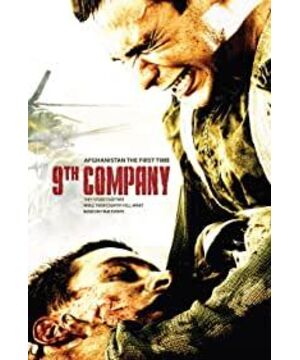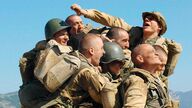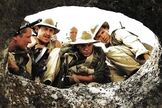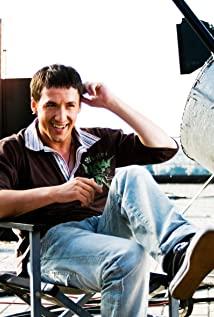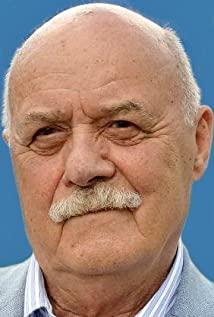There is nothing wrong in his opinion. He is a romantic painter. In his eyes, violence is also a kind of beauty. Tanks and weapons constitute the elements of beauty.
But is she ugly or beautiful in war? I think everyone has their own Hamlet in their eyes. Personally, war is not like Nokind said that there are no impurities except life and death. As far as the war in Afghanistan itself is concerned, all she haunts is pain and dust, because she is unjust and extremely aggressive. I prefer the words of the lieutenant instructor: No one is good at fighting in Afghanistan, no. But in the end the phrase "to help them resist imperialist aggression for the sake of internationalism" is so false! Maybe the soldiers don't understand what the meaning of this war is. What they only understand is to fight for the motherland and stick to the last moment. Let me ask here, is the war in Afghanistan an export of revolution? My answer is no, the war agreement reached in the Politburo's back room is not for the happiness of the people, not for the so-called internationalism, but for self-expansion and self-interest. David McClellan is right in saying that the party has become a defender within the system and has long since taken off its revolutionary aura. And what exactly are the aging Politburo presidium members trying to do, will they not know for themselves?
Captain Deca deeply loves the soldiers, but this love is a deformed love. He loves war and soldiers, but he can't find a reasonable way to love them. He beats them with a leather whip and limbs. Teach them to truly be a qualified soldier, training to teach them skills, time to teach them feelings, but it is the deformity that no one really cares about equally. Some people may say that watching "Soldier Assault" is much better than them, but I believe that "The 9th Company" is the real training scene for soldiers, as Deka said: here you are all a piece of shit. Because the phenomenon of inequality between officers and soldiers is very serious all over the world, the root cause is the existence of a bourgeois army consciousness, and there is a relationship between oppression and the oppressed. Therefore, Deka's love left behind an air of sadness and sadness after all.
Entering Afghanistan is tantamount to entering a world with another set of rules. Before religion and nation were sent to the grave by future gravediggers, I had a kind of reverence for Islam. Fighting for Allah and dying for jihad is their happiness and they will be immortal. Look at the Muslims in the movie who are waging jihad, shouting Long Live Allah, and then look at some Soviet soldiers whose hearts have been devastated by the brutal war. The power of belief is enormous. If we truly turn belief into power, can we take a step forward when our subjective initiative is actively mobilized?
Massacres have long been commonplace in warfare, but in the 9th company, when the "hail" of the Soviet army hit the village, the eyes of the old man were so helpless. Although there may be no one in the village, is such venting of anger an internationalist approach? The death of Stas, I also showed a sense of helplessness. He was the only son of their family, and it was his compassion for the Afghan children that he sacrificed his precious life. This sacrifice was tragic and unprepared. of. Neither he nor the child who shot him were innocent, and they were drawn into it by an unjust war. However, the destruction of the "hailstone" leaves people with the fallacy that "they are all enemies". Civilians are innocent, but you make them helpless, depressed, and displaced. In the end, they will fight for themselves, for jihad, and for the nation. .
The film secretly reveals the sadness of petty bourgeoisie, from which we can secretly glimpse the subtle changes in the Soviet Union during the Gorbachev era. The West is constantly infiltrating, and children are also going to the end with their playthings. The ideal is disillusioned, the positions do not need to be guarded, the soldiers are wounded and killed; In the end, the troops withdrew from Afghanistan, and the soldiers were unable to find the north because of the cruel reality, so they retreated numbly. Two years later, the ideal was finally disillusioned, and the tricolor flag was hung on the top of the Kremlin, just as Lid said: Some of us are rich, some of us live at the bottom of society, and some of us are abandoned in small border towns. middle. What did the war give them? A painful memory, the strong country no longer exists, and it has become an ideal disillusionment.
Disillusionment of social ideals, disillusionment of who to fight for.
View more about 9th Company reviews


